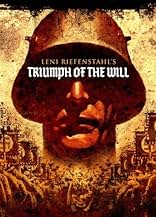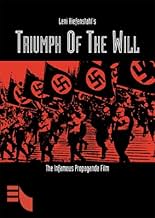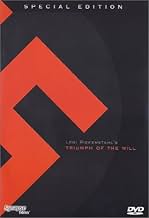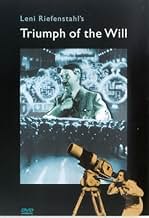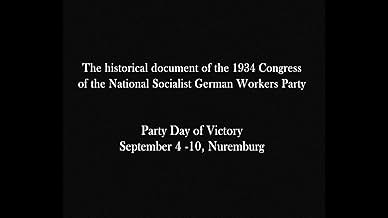- Awards
- 1 win & 1 nomination total
- Director
- Writers
- All cast & crew
- Production, box office & more at IMDbPro
Featured reviews
....although, in this case, once may be more than enough for some people. It's technically innovative, with several amazing camera shots, but the content is hollow and repetitive; if you make it through the endless parade footage, Hitler's final speech is the most inflammatory - and revealing. One thing that is made clear, however, is how hypocritical it is to retroactively condemn director Leni Riefenstahl for being seduced by the Nazi ideology at that point in time, when millions of Germans (and others around the world) were far more vocal in their support of the Fuhrer. *** out of 4.
10EdgarST
After winning elections, the National Socialist Party of Germany held a congress in 1934, a demonstration of force that was filmed "to show the world the triumph of the will of the German people." From the opening when the Führer literally arrives from heaven and the healthy, disciplined and pure Arian party members gather in Nuremberg, the documentary goes from the particular to the general with clever audiovisual manipulation, through marches, speeches and banners, turning the masses that celebrate the triumph of their will into a perfect piece of architecture, a magnificent structure that is reduced to the power of the Party. For decades, this so-called work of "reactionary modernism" was dismissed after the revelation of the Nazis' iniquity. However, after emotions are subdued, the masterfulness of director Leni Riefenstahl is evident (see "Die Match der Bilder.") In this and her 1938 film of the Olympic Games in Berlin, "Olympia", she coined techniques that today are common place in the entertainment industry. So don't be surprised if today you watch a football game with technical solutions of Nazi origin...
In 1934, the Nazi fortress was built on the election of Adolf Hitler as chancellor, the timely death of Hindenburg, and the infamous purge that caused the deaths of hundreds of SA members, the most emblematic one, being Rohm. Hitler's aura was then total but he needed to touch the German people in the broadest way. Only the big screen could fulfill the ambitious challenge of controlling the people at a distance by immortalizing the Nuremburg Rally of 1934.
Indeed, in the 30's, in a totalitarian system, a man with a camera could be more powerful than any soldier, but this wasn't a man who was assigned the task, but a woman, a promising talent named Leni Riefenstahl. And "Triumph of the Will" is a triumph on the field of film-making as it delivers some of the most spectacular and impressively creative shots for their time as if Riefenstahl was driven by the same desire to try new techniques, like Orson Welles when he made "Citizen Kane", six years later. But there's a reason why "Citizen Kane" is considered a masterpiece and not "Triumph of the Will", and the answer comes from Orson Welles himself.
Welles said that you could make a masterpiece in anything: even in pornography, if you intended to excite people and stimulate them sexually. However, you could never make a masterpiece that happens to be a pornographic film, because a libido is too low and too easily aroused in the first place. I paraphrased him in my review of "Lifeboat" to explain that propaganda, reprises the same role as pornography: it arouses easy emotions, in that case, instinct of superiority. In other words, you can make a masterpiece of propaganda, but not a masterpiece that happens to be a 'propaganda' film. So if I want to stick to my guns and follow my logic, I would say "Triumph of the Will" is a masterpiece of propaganda, but not a masterpiece.
Does this really matter? Well, inasmuch as Riefenstahl claimed that she made a documentary, capturing a significant chapter of Germany's history, I think it's important to set things straight, call a spade a spade and "Triumph of the Will" propaganda. It has an indubitable documentary value, but only from the perspective of a non-Nazi sympathizer, which doesn't only mean the majority of people born after the War, but even the majority of non-German people at the very time of the film's release. I'm not sure Riefenstahl wanted to address the German people with a simple 'documentary' movie, not one that 'objectively' exhilarates Hitler's success in making the eagle rise from the ashes of World War I and the infamous Treaty of Versailles.
And this constitutes the prologue of the film, depicting Germany's recovery's as a miracle only 19 months after Hitler's election, and the next shot sets the tone. While you expect to see a swastika or some marching soldiers taken in reverse shot, what do you get? Clouds. It's a heavenly sight taken from Hitler's private plane, featuring him like an Angel coming from the sky, to save Germany. This is a very clever trick that foresees the uses of religious undertones in each shot. Hitler is like a messianic figure acclaimed by crowds all reassembled to cheer and shout for him. Even the rallies at night, with the flags and torches carry a strange mysticism that Leni's eye never fails to catch.
And this is a fearsome sect-like atmosphere where each sentence shouted, sometimes eructed in that guttural German accent is followed by Pavlovian "Sieg Heil". It's not people shouting, it's one voice in unison and this is another aspect of the film: masses; and Riefenstahl knows how to handle them. In the Nazi conception of people, there's no individuality, there's no possible order when you consider each person's specificity, because by doing so, you accept the presence of "parasites" and we know where this judgment leads No, each individual is like an atom linked to another one and assembling into one homogeneous form, a mass.
Look at these shots of workers carrying their shovels like rifles, at these young men during the roll call, or in their tents before Hitler's arrival, they all look the same, shirtless and smiling, either same uniform or same absence of uniform. There is a vertiginous shot at World War I memorial, perhaps the most beautiful of the film, where Hitler walks between rows of soldiers. The mass was so compact, that I thought it was a garden at first. This is a film made by a director who knows exactly the effects to create. Of course, she's right when she says that there's no anti-Semitic statement in the film, but that's beside the point. Such a movie touched German people and convinced the rest of skeptics that the salvation come from Hitler, so when the next rally of Nuremburg lead to the racial laws, the receptiveness of the people owed a little to this masterpiece of propaganda.
That said, I'm inclined to believe that Leni Riefenstahl, like a vast majority of Germans, believed, that salvation could only come from Hitler, and that she genuinely wanted to highlight this in her 'documentary'. Let's not just dismiss the film for what it is, and not get things mixed up. Its merit is not to be a documentary about a rally, it's too biased for that, but to provide hints of answers for the questions that come to mind after watching World War II or holocaust movies: how could that happen? Well, "Triumph of the Will" is almost meta-referential in the way the people's zeal is echoed by the filmmaker's stylistic approach. People wanted to believe in Hitler, they might have regretted it after, but they succumbed to his 'charisma' and in a way, his "will" as evil as it was, had triumphed.
It's only on the basis of this historical magnitude that the film can be considered great.
Indeed, in the 30's, in a totalitarian system, a man with a camera could be more powerful than any soldier, but this wasn't a man who was assigned the task, but a woman, a promising talent named Leni Riefenstahl. And "Triumph of the Will" is a triumph on the field of film-making as it delivers some of the most spectacular and impressively creative shots for their time as if Riefenstahl was driven by the same desire to try new techniques, like Orson Welles when he made "Citizen Kane", six years later. But there's a reason why "Citizen Kane" is considered a masterpiece and not "Triumph of the Will", and the answer comes from Orson Welles himself.
Welles said that you could make a masterpiece in anything: even in pornography, if you intended to excite people and stimulate them sexually. However, you could never make a masterpiece that happens to be a pornographic film, because a libido is too low and too easily aroused in the first place. I paraphrased him in my review of "Lifeboat" to explain that propaganda, reprises the same role as pornography: it arouses easy emotions, in that case, instinct of superiority. In other words, you can make a masterpiece of propaganda, but not a masterpiece that happens to be a 'propaganda' film. So if I want to stick to my guns and follow my logic, I would say "Triumph of the Will" is a masterpiece of propaganda, but not a masterpiece.
Does this really matter? Well, inasmuch as Riefenstahl claimed that she made a documentary, capturing a significant chapter of Germany's history, I think it's important to set things straight, call a spade a spade and "Triumph of the Will" propaganda. It has an indubitable documentary value, but only from the perspective of a non-Nazi sympathizer, which doesn't only mean the majority of people born after the War, but even the majority of non-German people at the very time of the film's release. I'm not sure Riefenstahl wanted to address the German people with a simple 'documentary' movie, not one that 'objectively' exhilarates Hitler's success in making the eagle rise from the ashes of World War I and the infamous Treaty of Versailles.
And this constitutes the prologue of the film, depicting Germany's recovery's as a miracle only 19 months after Hitler's election, and the next shot sets the tone. While you expect to see a swastika or some marching soldiers taken in reverse shot, what do you get? Clouds. It's a heavenly sight taken from Hitler's private plane, featuring him like an Angel coming from the sky, to save Germany. This is a very clever trick that foresees the uses of religious undertones in each shot. Hitler is like a messianic figure acclaimed by crowds all reassembled to cheer and shout for him. Even the rallies at night, with the flags and torches carry a strange mysticism that Leni's eye never fails to catch.
And this is a fearsome sect-like atmosphere where each sentence shouted, sometimes eructed in that guttural German accent is followed by Pavlovian "Sieg Heil". It's not people shouting, it's one voice in unison and this is another aspect of the film: masses; and Riefenstahl knows how to handle them. In the Nazi conception of people, there's no individuality, there's no possible order when you consider each person's specificity, because by doing so, you accept the presence of "parasites" and we know where this judgment leads No, each individual is like an atom linked to another one and assembling into one homogeneous form, a mass.
Look at these shots of workers carrying their shovels like rifles, at these young men during the roll call, or in their tents before Hitler's arrival, they all look the same, shirtless and smiling, either same uniform or same absence of uniform. There is a vertiginous shot at World War I memorial, perhaps the most beautiful of the film, where Hitler walks between rows of soldiers. The mass was so compact, that I thought it was a garden at first. This is a film made by a director who knows exactly the effects to create. Of course, she's right when she says that there's no anti-Semitic statement in the film, but that's beside the point. Such a movie touched German people and convinced the rest of skeptics that the salvation come from Hitler, so when the next rally of Nuremburg lead to the racial laws, the receptiveness of the people owed a little to this masterpiece of propaganda.
That said, I'm inclined to believe that Leni Riefenstahl, like a vast majority of Germans, believed, that salvation could only come from Hitler, and that she genuinely wanted to highlight this in her 'documentary'. Let's not just dismiss the film for what it is, and not get things mixed up. Its merit is not to be a documentary about a rally, it's too biased for that, but to provide hints of answers for the questions that come to mind after watching World War II or holocaust movies: how could that happen? Well, "Triumph of the Will" is almost meta-referential in the way the people's zeal is echoed by the filmmaker's stylistic approach. People wanted to believe in Hitler, they might have regretted it after, but they succumbed to his 'charisma' and in a way, his "will" as evil as it was, had triumphed.
It's only on the basis of this historical magnitude that the film can be considered great.
A historical film capturing the1934 Nazi party rally in picturesque Nazi hotbed of Nuremberg, Filmed over a number of days it contains all the leading lights of National Socialism in pre-war Germany making speeches to the faithful. It also shows the various clips of the different organizations within National Socialism ie.The Hitler Youth in all their Arian glory excited and in gleeful expectation of seeing their Fuhrer,The goosestepping standard bearers of the S.A. and the S.S. paying homage to their glorious leader. Triumph of the Will captures the state of the German nation and the Nazi mindset perfectly ,and I felt a sense of foreboding with the bluntness of some of the speeches. The film is full of very striking German Expressionism Cinema techniques,never more so than in the night shots, full of torch bearing storm troopers and the Nazi faithful hailing their glorious leader..Goebbels vision was put brilliantly to film by Riefenstahl who had over thirty cameras to film every incident of the event.This is truly a masterclass in Propaganda but it is also one in Cinema,Triumph of the Will truly is a triumph of Cinema and despite its content should be seen as one. Riefenstahl for her part was imprisoned for four years after the war and never was able to reinvent her career as a top Director,a real and tragic loss to Cinema
This film can only be judged or analyzed in any meaningful way only by those who can envision Germany and its people with the hindsight of the decade following its defeat in WWI and the ensuing economic chaos of the 1920s. For those of us who can objectively remove ourselves from our time and revisit the year in which it was filmed, 1934, and then compare it only with all other films made during that early part of the 20th Century can we locate the single word describing it
astonishing.
We are called to objectivity when commenting on a book or film, a piece of art, or product. Only when that is accomplished does a comment have any enduring and meaningful value. Another thing I have found astonishing about this film and its creator is the seemingly unique inability of those commenting on it to be objective. It is seen in the overwhelming number of cases, not from the time in which it was made but with the hindsight of decades of history that had not yet taken place.
We are called to objectivity when commenting on a book or film, a piece of art, or product. Only when that is accomplished does a comment have any enduring and meaningful value. Another thing I have found astonishing about this film and its creator is the seemingly unique inability of those commenting on it to be objective. It is seen in the overwhelming number of cases, not from the time in which it was made but with the hindsight of decades of history that had not yet taken place.
Did you know
- TriviaThe film spent six months in the editing suite. The two-hour running time represents approximately 3% of the footage Leni Riefenstahl shot.
- Quotes
[last lines]
Rudolf Hess: The Party is Hitler. But Hitler is Germany as Germany is Hitler! Hitler, Sieg Heil! Sieg Heil!
crowd: Heil! Heil! Heil!...
- Alternate versionsThere is an Italian DVD edition of this movie, distributed by DNA Srl. The movie was re-edited with the contribution of the film history scholar Riccardo Cusin. This dvd contains the movie with its original aspect ratio and a new version adapted in 1.78:1 anamorphic for 16:9 screens. This version is also available in streaming on some platforms.
- ConnectionsEdited into Hitler Lives (1945)
- SoundtracksDie Fanhe Hoch (Raise High the Flag)
Horst Wessel
- How long is Triumph of the Will?Powered by Alexa
Details
Box office
- Budget
- DEM 280,000 (estimated)
- Runtime1 hour 54 minutes
- Color
- Aspect ratio
- 1.37 : 1
Contribute to this page
Suggest an edit or add missing content

Top Gap
By what name was Le triomphe de la volonté (1935) officially released in India in English?
Answer


